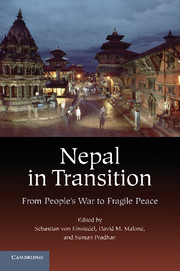14 - Conclusions
Published online by Cambridge University Press: 05 April 2012
Summary
Nepal is struggling with multiple interlocking transitions: from war to peace, from autocracy to democracy, and from an exclusionary and centralized state to a more inclusive and federal one. As elsewhere, in Nepal this postconflict transition, which is embedded in broader state transformation, has not been linear, has suffered setbacks, is likely to see future reversals, and is unlikely any time soon to be “completed.” To be sustainable, these multiple transitions will need to be underpinned by another transformation: from economic laggard to an economy offering both inclusion and growth, as well as economic governance reform.
All these transitions have been and should be largely domestically driven. Yet, at times outsiders have played a significant, often useful, but sometimes unhelpful role – as this volume has highlighted. This concluding chapter first assesses achievements so far and then examines key outstanding challenges facing major actors, both inside and outside Nepal.
Information
- Type
- Chapter
- Information
- Nepal in TransitionFrom People's War to Fragile Peace, pp. 361 - 382Publisher: Cambridge University PressPrint publication year: 2012
